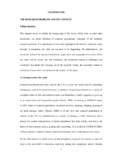Please use this identifier to cite or link to this item:
https://cris.library.msu.ac.zw//handle/11408/4034| Title: | Teachers, parents and students perceptions towards government policy on abolition of corporal punishment : a case of Gweru urban | Authors: | Musafari, Waniwa | Keywords: | Teachers, parents and students perceptions abolition of corporal punishment |
Issue Date: | 2016 | Publisher: | Midlands State University | Abstract: | The study investigated the teachers, parents and pupils` perceptions towards the government`s policy on abolishing corporal punishment in Gweru urban. This study investigated the teachers, parents and pupils` perceptions towards government`s policy on abolition of corporal punishment, reasons for abolishing corporal punishment and the corporal punishment strategies that can be put in place as alternative solutions to achieve abolition. The study used both qualitative and quantitative research designs. The sample comprised of 54 pupils, 6 teachers and 3 school heads of three selected schools of Gweru urban. Teachers and school heads who were participants in this study were purposively picked and the pupils were selected using systematic random sampling. An interview guide, questionnaire and focus group discussion were used to gather data from the 66 respondents of the study. Data collected from the respondents was analysed and presented using Microsoft Excel in form of graphs, tables and prose form. It came out in the study that on the teachers, parents and pupils` perceptions towards abolition of corporal punishment; parents and parents favour the abolition of corporal punishments, pupils view corporal punishment as harsh, causing fear and pain to them. In addition, teachers are against the abolition of corporal punishment claiming that pupils will become ungovernable and children support abolition of C.P stating pointing that it violates human and children`s rights. On reasons of abolishing corporal punishment; it came out that C.P instils fear and pain on children, it makes pupils develop negative perceptions towards C.P as well as that is can cause physical and psychological damage. On the alternative strategies of abolishing C.P, it came out that counselling, redemptive discipline and deprivation of children`s needs and withdrawal of positive reinforcement can work as alternative strategies. In this study, it was recommended that; curriculum planners, various stakeholders and the school administrators should educate the pupils and their parents on the effects of corporal punishment on pupils and the ministry of education should facilitate for training school administrators and teachers on alternative ways of disciplining children without using CP. Further, school administrations should ensure that sporting activities are provided adequately to reduce elements of misconduct amongst pupils thus refraining from using corporal punishment at the same time. | URI: | http://hdl.handle.net/11408/4034 |
| Appears in Collections: | Bachelor of Educational Foundations and Curriculum Studies |
Files in This Item:
| File | Description | Size | Format | |
|---|---|---|---|---|
| whole project waniwa final.pdf | Full Text | 1.28 MB | Adobe PDF |  View/Open |
Page view(s)
116
checked on Dec 1, 2024
Download(s)
100
checked on Dec 1, 2024
Google ScholarTM
Check
Items in MSUIR are protected by copyright, with all rights reserved, unless otherwise indicated.



